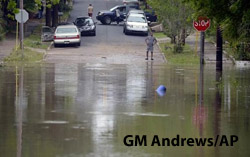What to do if your vehicle becomes submerged
May 21, 2014 | Category: Automobile Accidents | Share Five inches of rain fell on Pensacola, Florida, in a single hour, from 9 p.m. to 10 p.m. Tuesday, April 29, 2014 - more than during all of Hurricane Ivan, which rolled through in 2004, said Kevin Roth, lead meteorologist for The Weather Channel. The worst flooding in Florida in a generation left many drivers stranded in the rising water.
Five inches of rain fell on Pensacola, Florida, in a single hour, from 9 p.m. to 10 p.m. Tuesday, April 29, 2014 - more than during all of Hurricane Ivan, which rolled through in 2004, said Kevin Roth, lead meteorologist for The Weather Channel. The worst flooding in Florida in a generation left many drivers stranded in the rising water.
ABC News reported that insurance and automotive groups say more than 11,000 accidents occur each year in which a vehicle ends up in the water. In most water crashes, a vehicle will float for a period of time before the weight of the engine pulls the vehicle under.
Although emergency personnel conduct water rescue drills, experts say that it is usually up to drivers to have a plan before vehicles become submerged. Jason Morss, a firefighter and paramedic in Fort Lauderdale says, "Staying calm is the number one priority. When things go wrong under water, there is not time for second chances."
Gordon Geisbrecht of the University of Manitoba, Canada, trains law enforcement officers and others on underwater-vehicle escape. Mr. Geisbrecht says that a person has about one minute to get out alive. Here are his the five rules of survival:
Rule #1 - Do not call 911 until you are out of the vehicle. Every second counts.
Rule #2 - Unbuckle
Rule #3 - Do not open the door. Roll down the windows instead. Not only is opening the door very difficult against the water pressure, it will allow so much water into the vehicle that it will speed up the sinking process. The floating period is 30 seconds to a minute until the water rises to the bottom of the passenger windows. The water pressure after that time period, according to Mr. Geisbrecht, will force the window against the door frame, which will make it essentially impossible to roll down. If you cannot roll down the windows, break one. There are some popular tools that can be used to break vehicle windows. Two of the more popular are the LifeHammer and the ResQMe. It is recommended that whatever window-breaking tool is selected, it is kept in a handy place in the vehicle.
Rule #4 - Children first, starting with the oldest.
Rule #5 - Get out and swim as fast as possible.
"Living in Florida, we often have heavy rains resulting in flooding or poor road conditions. Knowing what to do before a vehicle becomes submerged can make the difference between life, serious injury or death," says Lee County Accident Attorney, Randall Spivey of Spivey Law Firm, Personal Injury Attorneys, P.A.
Lee County Accident Attorney, Randall L. Spivey is a Board Certified Trial Attorney – the highest recognition for competence bestowed by the Florida Bar and a distinction earned by just one (1%) percent of Florida attorneys. He has handled over 2,000 personal injury and wrongful death cases throughout Florida. For a free and confidential consultation to discuss your legal rights, contact the Spivey Law Firm, Personal Injury Attorneys, P.A., in Lee County at 239.337.7483 or toll free at 1.888.477.4839,or by email to Randall@SpiveyLaw.com. Visit SpiveyLaw.com for more information. You can contact Spivey Law Firm, Personal Injury Attorneys, P.A.in Charlotte County at 941.764.7748 and in Collier County 239.793.7748.

